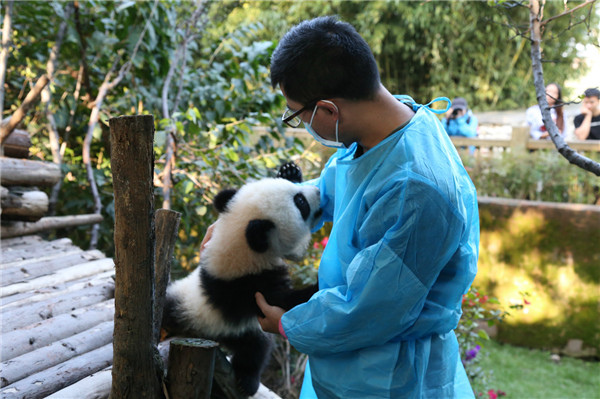Pandas benefit as their keepers adapt


A breeder from the Chengdu Research Base of Giant Panda Breeding in Sichuan province takes care of a newborn panda cub. [Photo by Chen Cheng for chinadaily.com.cn]
Forty-eight captive giant pandas were born worldwide this year. Forty-five are alive, bringing the total number of captive pandas globally to 548, said Li Chunliang, deputy director of the National Forestry and Grassland Administration.
Li made the remarks during the International Conference for the Giant Panda Conservation and Breeding and 2018 Annual Conference of the Chinese Committee of Giant Panda Breeding Techniques held in Chengdu, Sichuan province, on Thursday.
Thirty-one of the cubs belong to the China Conservation and Research Center for the Giant Panda, 11 to the Chengdu Research Base of Giant Panda Breeding and three to the Beijing Zoo, he said.
Hosted by the administration and the Sichuan, Shaanxi and Gansu provincial governments, the conferences have drawn panda experts from home and abroad to compare notes on the protection and breeding of pandas, disease prevention, returning pandas to the wild and protecting companion animals.
Participants at the conferences hailed the high birthrate. In the past, it was a frequent problem that captive pandas had no desire to mate, and survival was difficult for any cubs that were born, said Zhang Hemin, deputy chief of the research center.
At that time, researchers did not understand pandas' habits. Thinking they preferred a solitary life, researchers kept the animals isolated in tiny dens and fed them only bamboo.
As a result pandas became depressed, Zhang said.
As a way out, researchers provided captive pandas with more opportunities to communicate socially with each other and play.
Male and female pandas were swapped into the dens of the opposite sex so that each would know the smell of the other.
In the wild, pandas eat bamboo. They seek out the best plants-those receiving adequate sunshine and providing the best nutrition.
Since researchers could not provide that kind of bamboo for the captive pandas, they created a biscuit rich in trace elements and vitamins, Zhang said.
Wild pandas stay active for many hours each day. To emulate their natural environment, researchers tried putting the biscuits in places the pandas could not find easily, aiming to get them to move around.
To make them play, they froze fruits before giving them to the pandas. They had to play with the fruits until they thawed if they wanted to eat them, Zhang said.
Earlier, many newborn panda cubs died because of abandonment. Typically, half of newborns are twins, and the mother would end up caring for only one.
A mother panda would first try to care for both cubs, but several hours later, when she realized she could not, she would abandon one. If she tried to support both, both would die, Zhang said. Researchers did not know how to handle the abandonment problem, and the death rate was high.
They eventually settled on a course that was part philanthropy and part trickery. They would take away the deserted baby and feed it milk; then they would switch it with the favored cub from time to time. In that way, the mother unwittingly supported both.
The mother would lick different parts of the newborn cub, including its anus to get its droppings out. Researchers learned to use a cotton swab to mimic the mother when handling a deserted cub to get the droppings out.
Such approaches ensured the cubs' survival, Zhang said.
MOST POPULAR
- 1 $39.7 billion worth of deals inked at Airshow China
- 2 China announces tax relief measures to stabilize real estate sector
- 3 A look at China's economy in October, 2024
- 4 Public holiday extension announced
- 5 China's NEV annual production hits 10 million milestone amid global carbon reduction efforts
Editors' Picks
 Infographic:
Golden jubilee of China-Brazil relations
Infographic:
Golden jubilee of China-Brazil relations
 Infographic:
A look at China's economy in October, 2024
Infographic:
A look at China's economy in October, 2024
 Infographic:
G20 at a glance
Infographic:
G20 at a glance
 Video:
Peru sees new port open
Video:
Peru sees new port open



